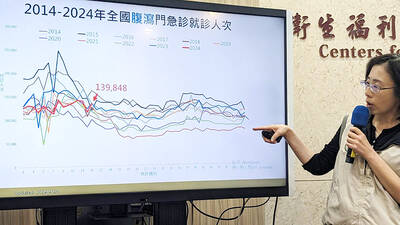Echoing former Taiwan High Speed Rail Corp (THSRC) chairwoman Nita Ing’s (殷琪) remark that migration of industries was what “killed” the high-speed rail business, Taiwan Solidarity Union Chairman Huang Kun-huei (黃昆輝) yesterday said the government’s plan to sign an economic cooperation framework agreement (ECFA) with China would just make the situation worse.
“Ing said that migration of industries [to China] ‘killed domestic airlines and the high-speed rail,’ but I think it’s only the beginning,” Huang told a press conference. “The situation will only get worse as the government continues to open up to and signs an ECFA with China.”
Before stepping down as THSRC chairwoman, Ing said in an inteview with Common Wealth (天下雜誌) magazine that the migration of industries to China was a key reason why THSRC was NT$400 billion (US$12.3 billion) in debt. She said that more than 2 million people have moved to China to work in the past 12 years because of the government’s policy to open up to China, reducing the average daily number of passengers from an estimated 230,000 to 80,000.
Huang agreed with Ing and said that after signing an ECFA with China, Taiwan’s markets would further open up to China which would have a grave impact on low-skilled workers and low-threshold industries, as more people would leave for China and the dumping of cheap Chinese products would be more common.
“[The ECFA] will cause an employment and wealth crisis for the Taiwanese,” he said.
Huang added that when former president Lee Tung-hui (李登輝) was in power and applied a more restrained policy toward cross-strait economic exchanges, “the average growth rate was 6.5 percent.”
“Since the government started opening up to China economically in 2001, however, average economic growth has dropped to around 3.8 percent,” Huang said. “A year after President Ma Ying-jeou [馬英九] took office and enhanced cross-strait exchanges, the economy has contracted by minus 3.52 percent.”
He said that if the former president’s cross-strait policies had been continued, “the per capita average income would have doubled.”
Straits Exchange Foundation (SEF) Vice Chairman Kao Koong-lian (高孔廉), on the other hand, argued that Taiwan would face a dilemma of being marginalized from major economic entities in Asia if it failed to speed up negotiations on signing an ECFA with Beijing.
Kao made the remarks in Taipei yesterday while addressing a forum of China-based Taiwanese businesspeople.
Kao said Taiwan would soon lose its global competitiveness and face the crisis of being marginalized by Japan, South Korea, China and ASEAN if it did not develop a closer economic relationship with China.
“We must step up efforts to sign an ECFA with China before ASEAN including China, Japan and South Korea form a regional economic bloc,” Kao told the forum.
Kao admitted that the proposed pact was not 100 percent conducive to Taiwan, but he emphasized that its advantages outweighed its disadvantages, adding that a smaller economic entity usually benefits from economic integration with a bigger one.
The penetration of Taiwanese products in the Chinese market began to deteriorate three years ago, but Kao said there was much room for development in the service sector.

THE HAWAII FACTOR: While a 1965 opinion said an attack on Hawaii would not trigger Article 5, the text of the treaty suggests the state is covered, the report says NATO could be drawn into a conflict in the Taiwan Strait if Chinese forces attacked the US mainland or Hawaii, a NATO Defense College report published on Monday says. The report, written by James Lee, an assistant research fellow at Academia Sinica’s Institute of European and American Studies, states that under certain conditions a Taiwan contingency could trigger Article 5 of NATO, under which an attack against any member of the alliance is considered an attack against all members, necessitating a response. Article 6 of the North Atlantic Treaty specifies that an armed attack in the territory of any member in Europe,

FLU SEASON: Twenty-six severe cases were reported from Tuesday last week to Monday, including a seven-year-old girl diagnosed with influenza-associated encephalopathy Nearly 140,000 people sought medical assistance for diarrhea last week, the Centers for Disease Control (CDC) said on Tuesday. From April 7 to Saturday last week, 139,848 people sought medical help for diarrhea-related illness, a 15.7 percent increase from last week’s 120,868 reports, CDC Epidemic Intelligence Center Deputy Director Lee Chia-lin (李佳琳) said. The number of people who reported diarrhea-related illness last week was the fourth highest in the same time period over the past decade, Lee said. Over the past four weeks, 203 mass illness cases had been reported, nearly four times higher than the 54 cases documented in the same period

Heat advisories were in effect for nine administrative regions yesterday afternoon as warm southwesterly winds pushed temperatures above 38°C in parts of southern Taiwan, the Central Weather Administration (CWA) said. As of 3:30pm yesterday, Tainan’s Yujing District (玉井) had recorded the day’s highest temperature of 39.7°C, though the measurement will not be included in Taiwan’s official heat records since Yujing is an automatic rather than manually operated weather station, the CWA said. Highs recorded in other areas were 38.7°C in Kaohsiung’s Neimen District (內門), 38.2°C in Chiayi City and 38.1°C in Pingtung’s Sandimen Township (三地門), CWA data showed. The spell of scorching

A group of Taiwanese-American and Tibetan-American students at Harvard University on Saturday disrupted Chinese Ambassador to the US Xie Feng’s (謝鋒) speech at the school, accusing him of being responsible for numerous human rights violations. Four students — two Taiwanese Americans and two from Tibet — held up banners inside a conference hall where Xie was delivering a speech at the opening ceremony of the Harvard Kennedy School China Conference 2024. In a video clip provided by the Coalition of Students Resisting the CCP (Chinese Communist Party), Taiwanese-American Cosette Wu (吳亭樺) and Tibetan-American Tsering Yangchen are seen holding banners that together read: